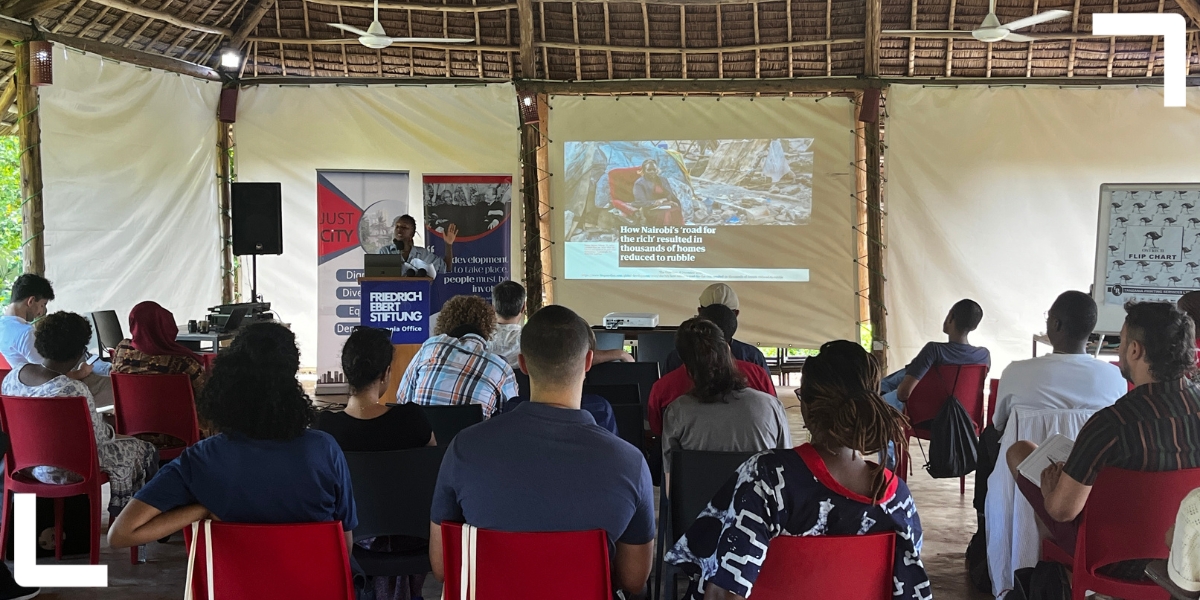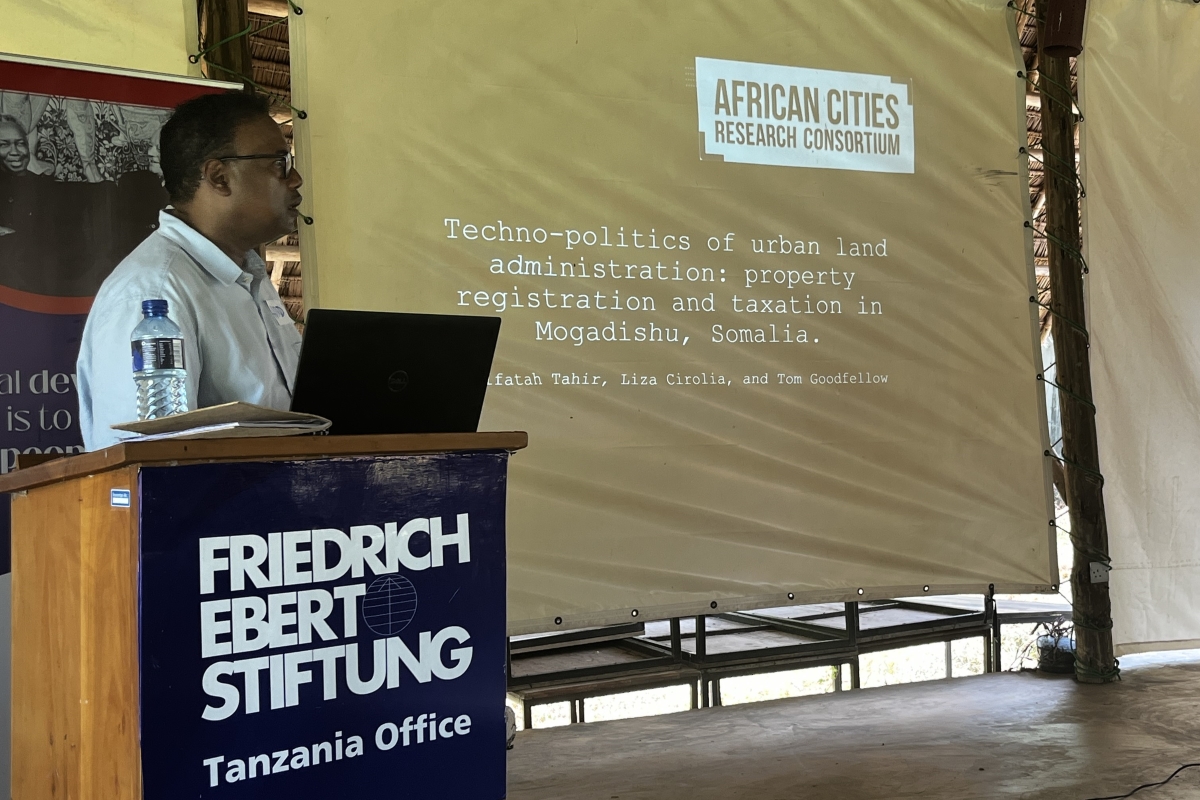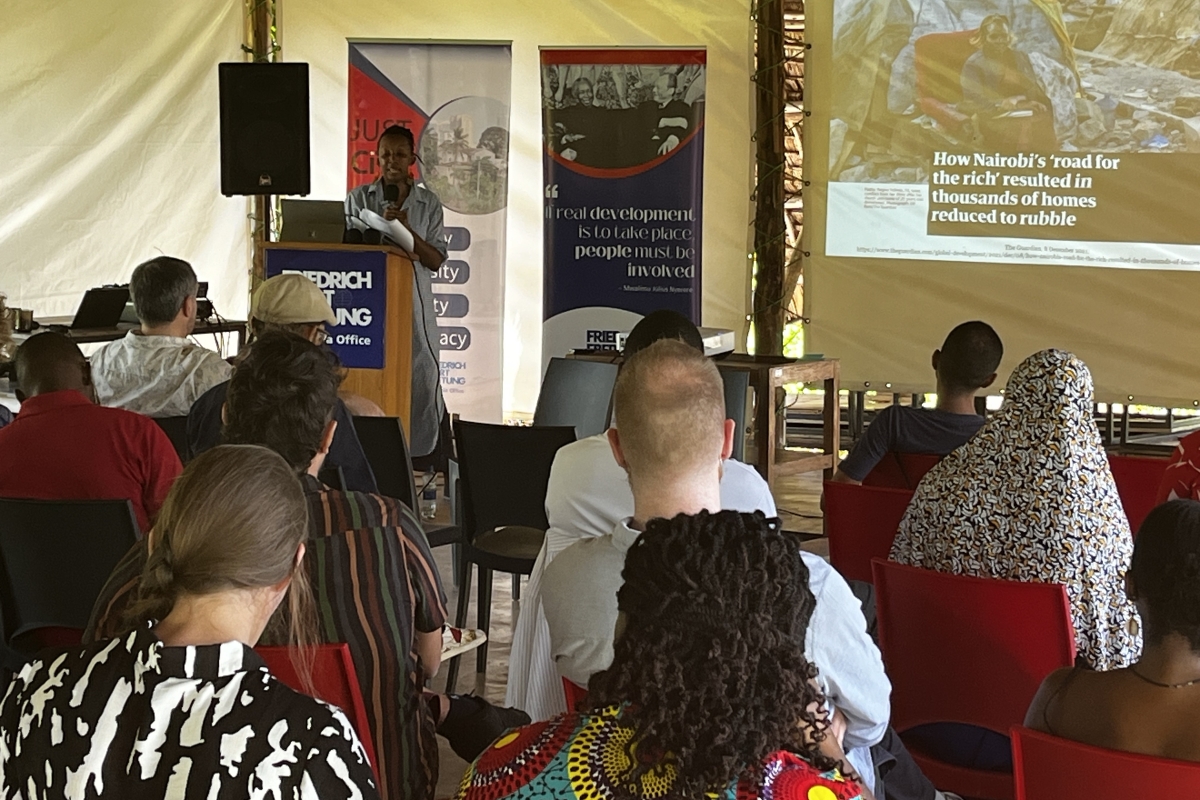The UTA-Do 2024 event marked a significant gathering of scholars, practitioners, and activists dedicated to expanding and deepening the discourse on urban Africa.
Held at Ardhi University and Friedrich Ebert Stiftung in Dar es Salaam, Tanzania, this five-day programme was designed to challenge the dominant geographies of knowledge production and to foster a multidisciplinary approach towards understanding urban Africa.
The event facilitated a dynamic exchange of ideas, encouraging attendees to challenge preconceived notions and explore innovative solutions tailored to the specific needs and aspirations of African cities. Moreover, UTA-Do 2024 served as a platform for networking and building lasting connections among individuals and institutions working towards similar goals.
Land and connectivity in Mogadishu
To showcase ACRC’s land and connectivity work at this event, I presented a lecture drawing on a work in progress that I am co-authoring with Liza Cirolia and Tom Goodfellow. The presentation began with an explanation of the ACRC’s conceptual framework, offering an overview of its investigative approach.
The focus then shifted to Mogadishu for a detailed exploration, emphasising the technopolitics of land administration in the city. In so doing, the presentation explored the technicality of the introduction and resistance to e-governance initiatives for property taxation in Mogadishu.
Abdifatah Tahir presenting at UTA-Do 2024. Photo credit: Liza Cirolia
It revealed the intricate ways in which technology, politics and land administration interweave, shaping a contested governance landscape in Mogadishu. It also highlighted how the technopolitics of land administration in the city are a complex matrix of negotiation, conflict and compromise involving various stakeholders, including the state apparatus, broader society and international partners. It showed how this multifaceted interaction creates a chaotic yet logical landscape where the state and society engage in continuous dialogue, but the outcome often remains minimal progress towards improving livelihoods in the city.
The presentation also highlighted ACRC’s advocacy efforts aimed at fostering change through active engagement. An exercise designed to animate this aspect of ACRC’s work demonstrated the practical challenges and dilemmas scholars face in advocating for transformation within such complex urban environments. The discussion extended to the roles and responsibilities of individual researchers across different geographies and times, underscoring the diverse approaches and characters researchers can adopt in their work.
UTA-Do 2024 programme
The opening day of UTA-Do 2024 was graced by a welcoming address from Professor Kombe of Ardhi University, who has been instrumental in shaping urban debates in Tanzania and Africa, and leads ACRC’s team in Dar es Salaam.
This first day featured a keynote online lecture by Gautam Bhan from the Indian Institute of Human Settlements, focusing on Southern urbanism and its implications for understanding urban Africa through the lens of the global South. Huda Tayob led a methods and writing workshop, leveraging her experience and the creative use of diverse archives. The day concluded with discussions on spatial experiments in Dar es Salaam and the role of African historians in conceptualising post-colonial experiences, setting a tone of critical engagement and interdisciplinary dialogue.
The second day delved into the economic dimensions of urban Africa, exploring themes from financialisation and infrastructure to digital platforms and welfare. Stefan Ouma’s keynote addressed the study of capitalism in African cities, highlighting the vocabulary of accumulation. Sessions with Liza Cirolia and Andrea Pollio examined the governance of service delivery systems, while Sabatho Nyamsenda discussed financial capitalism and precarity in Tanzania.
Day three tackled the intricate dynamics of power and politics in urban settings. Wangui Kimari provided insights into institutionalised power, drawing on her ACRC research on safety and security in Nairobi. The day’s proceedings also emphasised the importance of mobilisation and activism across various scales, concluding with opportunities for mentoring and collaborative planning.
The fourth day centred on identity, with a special emphasis on Black geographic and feminist thought. Adam Bledsoe and the team of Tatu Limbumba and Priscila Izar delivered keynotes that paved the way for a field trip to the Manzeze Working Women’s Cooperative. This experience highlighted grassroots struggles and collaborative solutions in Dar es Salaam.
Wangui Kimari presenting at UTA-Do 2024. Photo credit: Liza Cirolia
The closing day of UTA-Do 2024 celebrated creativity and the arts in urban research and practice. Huda Tayob revisited the Archive of Forgetfulness, exploring themes of mobility and infrastructure. An interactive session further delved into creative methodologies for urban studies. The event concluded at the Goethe Institute, showcasing films, performances, and music, encapsulating the rich and diverse approaches to understanding and shaping urban Africa.
Conclusion
UTA-Do 2024 served as a catalyst for ACRC’s land and connectivity researchers to critically reflect on our methodologies and advocacy strategies. Researchers play multifaceted roles, in not just understanding, but also shaping urban landscapes.
This has reinforced the significance of active engagement and advocacy in driving meaningful change, highlighting the need for scholars to navigate the delicate balance between rigorous research and practical, impactful interventions in urban development.
Header photo credit: Liza Cirolia. Wangui Kimari presenting at UTA-Do 2024 in Dar es Salaam, Tanzania.
The African Cities blog is licensed under Creative Commons Attribution-NonCommercial-NoDerivatives 4.0 International (CC BY-NC-ND 4.0), which means you are welcome to repost this content as long as you provide full credit and a link to this original post.




